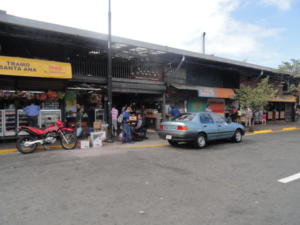Kat Sunlove, TheCostaRicaNews.com
Those of us of retirement age can certainly remember these old song lyrics:
The moon belongs to ev’ryone
The best things in life are free
The stars belong to ev’ryone
They gleam there for you and me
The flowers in spring
The robins that sing
The sunbeams that shine
They’re yours, they’re mine
And love can come to ev’ryone
The best things in life are free
Those sentiments could well apply to life here in Costa Rica. The tropical moon generously fills a star-spangled sky, a riot of flowers of red, orange, yellow, pink and orchid blanket the landscape and exotic animals from iguanas to monkeys to Turquoise-browed Motmot birds pay a visit at no charge to the viewer. Truly, much of the best parts of life here are free.
But even in retirement one must pay rent and utilities, buy food, deal with transportation needs and see a doctor now and then. So in answer to still another question from my reader Douglas, let’s take a look at Costa Rica’s cost of living.
Douglas lives in Austin, Texas, and he wondered if Costa Rica’s cost of living was “comparable to the U.S.” But of course, the cost of living in North America varies from one state to another, from small town to big city, even neighborhood to neighborhood. Equally important are variables unique to the individual of what income level one enjoys and what lifestyle choices a family makes. Do you feel you need two cars and a truck or is public transportation an option? Can you just not live without going to the theater twice a month or to a movie twice a week? Is that swimming pool a luxury or a necessity? Do you cook at home or eat out a lot? We make decisions every day that impact our financial resources, many of them a result of the bombardment of marketing messages in the media. Buy this, buy that, the ads command, and often consumers comply.
Generalizations about the cost of living in the U.S. or Costa Rica are difficult to make and harder to quantify. Living in a modest Tico-style house in a small rural pueblo is much cheaper than life in a modern Santa Ana condominium. Making use of buses and taxis rather than owning a car can save $5000 per year or more, according to our auto-owning friends. Stocking up on vegetables and fruits at the weekly feria (Costa Rican farmer’s market) not only yields fresh local produce but also is cost effective. It’s all in the choices you make.

There is great variation in prices between stores, as Layne and I discovered on a trip to MultiPlaza in Escazu, one of the upscale communities where many Gringos reside. We purchased an all-natural sweetener I like at a specialty health food store only to find a much lower price for the same size box at AutoMercado, a large grocery chain. Of course, imported items of all kinds are expensive because of the high customs duty charges imposed by Costa Rica. Some non-imported products are inexplicably expensive, such as cheeses. A medium-sized block of cheddar cheese is priced at over $5 at our local mercado even though produced here in Costa Rica by a large dairy company. However, if you buy groceries in volume, a la Costco in the States, then PriceSmart is a good option and fairly inexpensive. A membership is required but if you have space to store larger quantities then you will pay a fraction of what the individual items might cost elsewhere.
For expats who choose to buy property and build here, the cost of land can cause sticker shock. Although bargains can still be found in more remote areas, it is truly a case of what the market will bear. With retiring North Americans and Europeans moving in with cash, prices for bare land have soared. Labor costs are considerably lower than in the States so constructing a home from the ground up can still be done at a relatively reasonable price. As property owners, however, there are certain taxes that must be paid as well as the inevitable maintenance costs of home ownership, security in some areas, and service employees for gardening, housekeeping and general upkeep.

Layne and I manage to live comfortably on Social Security, spending about $2200 per month, out of our $3000 total. In order to cut costs, we have made some significant lifestyle changes: we have no car and rely on public transportation or the occasional rental car; we are renting an apartment rather than buying property, thus saving on taxes and maintenance, and utilities and Internet are included in our $650 rent; our cable TV runs about $35 a month; gardening and pool maintenance costs are borne by our landlords. Atenas is one of the more expensive areas but even here we have friends who get by on less than $1000 monthly income. We know we could find suitable housing at a lower cost if need be, but I love the swimming pool and we appreciate being within walking distance of town. We dip into our savings only for occasional extraordinary expenses, such as Layne’s recent brain scan at $440 or an eye exam at $63 and eyeglasses at about $170. And of course, trips to the U.S. are a financial drain, especially for things like family emergencies.
When we dine out, we generally patronize Tico restaurants that offer lower prices. Our breakfast today of Gallo Pinto (a beans and rice specialty) and two eggs, plus coffee, ran us about $3.50 each. At the Gringo-run restaurants, the same meal would be nearly twice as much. Since I enjoy gourmet cooking, we eat mostly at home and save considerably that way as well, although our costs are increased by our preference for organic and free-range foods. We certainly save money, compared to the U.S., by having no heating or cooling expense; where we live, all you need are ceiling fans. Of course, if you settle near the ocean where the weather is hot or in higher, cooler elevations, you could have climate control expenses. And as indicated in a previous article, our health care costs have dropped significantly in Costa Rica. With all these savings, we can afford a housekeeper at only $10 per week for five hours of excellent work. A good massage costs about $25. Haircuts run about $6.
Having made the choice to downsize and relocate, we find our life here in Costa Rica extremely pleasant and affordable, a far cry from the overhead of running our five-acre ranchette in California. When you consider all the free intangibles of living here — the tropical beauty, friendly people and excellent climate — Costa Rica continues to offer an attractive option for Baby Boomers headed for retirement.

